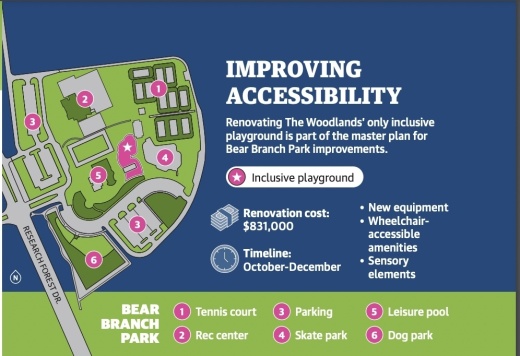The playground was originally opened in 2001, said Chris Nunes, the township’s director of parks and recreation. As the township’s only inclusive playground, which offers facilities for children with sensory processing issues, physical disabilities and other needs, this will include items to improve their experience, he said at a July 28 meeting.
“The project goals ... are geared toward inclusive play [and] trying to identify a play environment used by children in the least restrictive environment for children with disabilities,” Nunes said.
Contractor Lonestar Recreation will perform the work, which includes eight new ground-level play elements that are accessible by wheelchair transfer as well as an accessible merry-go-round that does not require wheelchair transfer to use. The updates also include sensory elements for children with autism and other needs. They engage children with tactile and vestibular play as well as audio and video elements and include items such as a chimney climb and a wiggle ladder, according to township officials.
Some of the other elements that will make the playground more accessible include the amount of shade provided and the visibility level for parents.
The playground is a destination for members of the community, including residents and visitors, because of its accessibility, Nunes said.
All of The Woodlands playgrounds meet Americans with Disability Act standards when they are installed, but additional measures are needed to increase their inclusivity.
Amy Wood, a parent in The Woodlands and president of the nonprofit Families for Effective Autism Treatment, said the amenities will help children with autism spectrum disorder to engage with each other as well as with other peers. Inclusive play areas are a needed resource in the community, she said.
“Kids with ASD oftentimes have trouble engaging with a lot of the play activities that neurotypical children do,” she said.
In addition, facilities such as this help parents find other parents to interact with and support each other.
“Families who have children with autism tend to get isolated,” Wood said. “When you find a group of other parents walking the same walk you are, that’s a special thing.”





